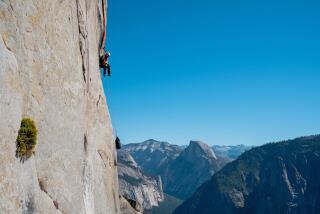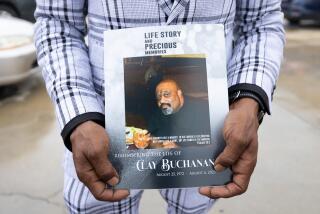The Stuff of Heroism
- Share via
When I was a kid, I used to walk around with my eyes closed, wondering what it would be like to be blind.
Years later I dressed in rags, let my beard grow and slept in a doorway, wondering what it was like to be homeless.
Last week I lay in a hospital bed unable to move and wondered what it was like to be Conrad Buchanan.
In each instance, mine was a temporary condition and there was no way I could truly relate to those I attempted to emulate. It was even more difficult to emulate Buchanan.
He’s the 26-year-old security guard who, in a startling burst of almost divine instinct, attempted to catch a woman who was committing suicide by jumping from a six-story Sherman Oaks parking structure.
Depressed and ill, Julie Light died anyhow, the weight and speed of her falling body slamming Buchanan to the ground. It broke his neck and left him paralyzed.
Media coverage was massive. In an age of tainted idols, we’re hungry for heroes, and Buchanan was the best of them, even after he was struck down.
I remember his wife, LaTonya, weeping before the cameras, saying that even if her husband could have anticipated the dreadful results of his effort, he’d still have tried to save the woman. He’s that kind of person.
And that’s what I lay thinking about in my momentary effort to become what he had become for the rest of his life.
*
I was in Tarzana Medical Center having a coronary artery unplugged. As part of the procedure, an opening was made in the groin. When it was over, I had to lie still for six hours, a heavy sandbag on me, to prevent bleeding.
It was a maddening experience. The bag wasn’t removed until 3 in the morning. I lay on my back all those hours, pinned to the bed, unable to sleep and listening to the voices of medical personnel that filtered into my room.
Because I was in intensive care, my room was open to the nurse’s station. A dim light shone across the ceiling. The detached voices and strange yellow lighting created an almost surreal condition. It was during this dream time that I began thinking about Buchanan.
In the morning, I’d be up and shuffling around the hospital corridor, and in the afternoon I’d be home slogging and bitching around the house. The likelihood is that Buchanan will never move anything but his head again.
But for a moment, a segment of time measured in blinks, he stood like a giant in the hazy sunlight of a Valley afternoon, arms outstretched, and tried to save the life of a woman he didn’t know.
I studied the soft patterns of light and shadow on the ceiling of my hospital room, not moving a muscle, and tried to imagine what Conrad Buchanan might have been thinking in that moment that separated him from health and total paralysis. I couldn’t.
*
Heroism is more than selflessness. It’s an instinct that overrides conscious decision and lays aside logic to leap into fire at any cost, the way a moth, for no good reason, seeks the flame.
There is no easy way to define a hero’s motivation, no way to isolate the components that contribute to moments so extraordinary that we wonder forever whatever caused him to do what he did.
I tried arranging an interview with Buchanan, but he’s in no condition to talk to a journalist. Even if he were, I doubt that he would be able to articulate his reasons for risking himself for another.
Acts of courage during war are almost understandable. The psychedelic chaos of battle, the wild highs of emotional stress, blur the line between life and death, creating a Daliesque landscape into which soldiers rush.
Quiet heroism is different. There are no bombs and bullets, no drums and bugles, to create an atmosphere of derring-do. One sees the fire and leaps or doesn’t leap. The act is done, the results final, and silence ensues.
In the case of Conrad Buchanan, what life he has left will rely upon medical equipment for sustenance. It will be, at best, a limited existence.
I lay wondering about it in the shadows of my hospital room, hearing the muted sounds, watching the pale light. I kept hearing LaTonya Buchanan say, “He’d do it again.”
And I realized that the kind of purity her husband had displayed in that fleeting rush of heroism is something, no matter how still I lay, I would never be able to emulate or understand.
*
Al Martinez’s column appears Tuesdays and Fridays. He can be reached online at [email protected]
More to Read
Sign up for Essential California
The most important California stories and recommendations in your inbox every morning.
You may occasionally receive promotional content from the Los Angeles Times.










